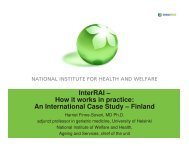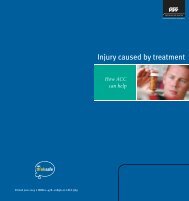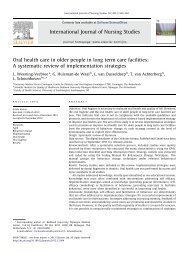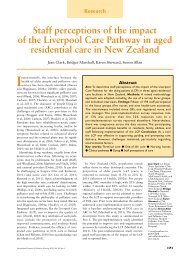Excellence - New Zealand Aged Care Association
Excellence - New Zealand Aged Care Association
Excellence - New Zealand Aged Care Association
You also want an ePaper? Increase the reach of your titles
YUMPU automatically turns print PDFs into web optimized ePapers that Google loves.
Feature<br />
HEALTH ED TRUST<br />
Five Ways to Motivate<br />
your Staff to Complete<br />
Education Programmes<br />
How important is education to your organisation?<br />
Health Ed Trust recently conducted Assessor Workshops<br />
in ten locations from Auckland to Invercargill. The first<br />
session each day was ‘How to Motivate Students’.<br />
The following is the combined wisdom from about<br />
300 attendees.<br />
Number One<br />
Fostering a great education culture in any organisation starts at<br />
the top. If Management and Assessors expect achievement and<br />
qualifications then this expectation flows through to all staff. A<br />
combination of enthusiasm, recognition and rewards backed up by<br />
company policy appear to set the culture that is the main contributor<br />
to high achievements.<br />
Allowing paid time for the Assessor to run classes and mark<br />
papers sends a message to the whole facility. A survey of<br />
attendees showed that paid time allocated for training activities<br />
varied from a challenging one hour a week to a generous one day<br />
a week. Of course, the size of the facility has a huge<br />
bearing on the time required.<br />
Number Two<br />
Recognition can be a powerful motivator; some students craved<br />
this more than rewards. Suggestions include the following.<br />
• Ceremonies where badges, certificates or flowers are<br />
presented are always appreciated. Morning/afternoon teas<br />
in front of other staff and residents, or BBQs with all the family<br />
invited give the caregivers a real sense of achievement.<br />
• One Assessor told of students being handed certificates<br />
as they arrive, without any presentation – this is a huge<br />
recognition opportunity wasted. This also devalues the<br />
achievement.<br />
• The Health Ed Trust Honours Board is used with great effect in<br />
many places. One facility puts the student’s name on the<br />
Board, without any of the coloured achievement squares,<br />
as soon as they start the programme. This motivates the<br />
caregivers to finish so their names can have the tags added as<br />
soon as possible. If your facility does not have an Honours<br />
Board, then frame the certificate and hang it in the foyer.<br />
• Only allowing caregivers to work in sought-after areas if they<br />
have completed education to a certain level.<br />
• Talking about how good the qualification will look on their CV<br />
and how the qualification is recognised throughout NZ.<br />
• Replacing the caregiver’s uniform with a different coloured<br />
uniform, to show that they are a trained staff member, is a<br />
recognition technique that works well at another facility.<br />
• Status symbols. One facility gives out an expensive-looking key<br />
ring to staff that have completed the programme. These are<br />
valued and carried with pride. Others give graduation bears.<br />
• Some Assessors reported how some caregivers like to set an<br />
example for their children.<br />
Number Three<br />
Rewards each time a programme is completed – suggestions<br />
include the following.<br />
• Pay increments. Varied from 10c to $1 per hour.<br />
• A paid day off.<br />
• $50 bonus.<br />
• One facility pays the caregiver 30 minutes for every hour they<br />
attend an education session.<br />
Number Four<br />
Peer Pressure. Taking small groups through the education<br />
programmes at one time can be used as a motivating factor.<br />
(Small groups were considered to be the best way to run an<br />
education programme onsite.)<br />
• Students love to receive their results quickly and see how they<br />
are progressing with each module. One Assessor refuses to mark<br />
any of the students’ modules until the whole group’s modules are<br />
handed in. If one student dares not to have papers in on time, the<br />
rest of the group applies pressure to the miscreant student.<br />
• Create a waiting list. Only take a few students through at a time.<br />
Take special interest in this group – everyone wants what they<br />
can’t have.<br />
Number Five<br />
Although only to be used as a last resort when nothing else<br />
works, a possibility is to include achieving the education<br />
programme as a requirement in the caregiver’s employment<br />
contract. When continued requests and encouragement do<br />
not produce any results, the issue can be managed as a<br />
performance issue.<br />
Why don’t caregivers want to complete programmes?<br />
It is always handy to know these reasons so objections can be<br />
overcome from the beginning.<br />
• Fear: This was first on the list at almost all locations. Mainly<br />
this was fear of failure, as caregivers had not done well at<br />
school, had English as a second language or thought the work<br />
would be too difficult. Suggestion: start with an easier Module.<br />
Encourage, encourage and encourage. Thousands of caregivers<br />
have completed ACE Courses.<br />
• Too busy: Well, can’t we all say that?! Break the assessment<br />
down and ask the caregiver to complete one or two questions<br />
each night.<br />
• Know it all: <strong>Care</strong>givers who have been employed for a long time<br />
say they don’t need to do this course. The best answer to this:<br />
“You will fly through it, then… You can help teach the others in<br />
the group.”<br />
• Too expensive: convince Management to at least go halves<br />
in the cost. Many more facilities are now paying all the<br />
processing fees for students.<br />
• Too close to retirement: Health Ed Trust has had several<br />
caregivers who are over 70 complete this course. It has been<br />
proven that it is very good for the brain cells to learn new things!<br />
Any other suggestions would be gratefully received.<br />
By Julie Sparks<br />
General Manager<br />
Health Ed Trust<br />
Ph 03 3798519<br />
Email Julie@healthedtrust.org.nz<br />
11. <strong>Excellence</strong> in CARE APRIL 2013









